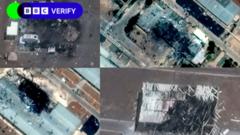The ongoing conflict between Israel and Iran has escalated drastically, with both nations engaging in heavy air strikes targeting each other's military and civilian facilities. Widespread destruction is reported in Tehran, and Israeli cities are facing retaliatory missile strikes, raising concerns about a larger regional war and its impact on global security.
Escalating Tensions: Iran and Israel Exchange Strikes Amid Fears of Broader Conflict

Escalating Tensions: Iran and Israel Exchange Strikes Amid Fears of Broader Conflict
As Israel ramps up military operations against Iran, significant damage to critical infrastructure and civilian casualties emerge, leading to broader implications for regional stability.
---
The conflict between Israel and Iran has reached critical levels over the weekend, escalating into an exchange of heavy airstrikes that have severely damaged key infrastructures and led to significant civilian casualties. Reports indicate that Israeli forces struck multiple targets in Tehran, including vital military and nuclear sites, while Iran retaliated with ballistic missiles targeting Israeli cities.
Over the past few days, Iran has endured extensive aerial attacks, prompting assurances from Israeli military officials that they are now capable of carrying out precision strikes deep within Iranian territory, heightening fears of a broader confrontation. The Israeli attacks have targeted sensitive locations, including missile bases, naval infrastructure, and oil and gas facilities, essential for Iran's economic stability.
Eyewitness accounts from Tehran describe massive explosions, with flames visible for miles as the Shahran fuel depot caught fire following Israeli bombardments. Unofficial sources suggest that the explosions have sent shockwaves through residential neighborhoods, prompting evacuation efforts. Residents described the chaos as overwhelming, with some likening the explosions to earthquakes.
Israel’s military actions have reportedly resulted in the deaths of more than 70 people in Iran, including several high-ranking military officials, while Iran's retaliatory strikes have caused casualties within Israel, claiming at least three lives and injuring dozens more. As Iranian projectiles fell on cities like Tel Aviv and Rishon LeZion, many Israelis sought refuge in bomb shelters, fearing a continuous wave of missile strikes.
The volatility of this situation has prompted international concern; leaders around the world are calling for de-escalation and restraint amid fears that this conflict could spiral into a major, regional war involving multiple nations. The U.S. has issued statements indicating its support for Israel while advocating caution to prevent further loss of life.
Meanwhile, both nations continue to express defiance, with Iran's leadership vowing retaliatory measures against what they deem aggressions from Israel, further deepening the divide and escalating military operations. While the dust settles over the immediate aftermath of these exchanges, the broader implications for peace in the Middle East remain precarious, as fear and instability grip both nations' populations amid the ongoing conflict.
With talks related to Iran’s nuclear program stalled and regional geopolitical dynamics shifting, the possibility of a prolonged and intensified conflict looms, leaving many to brace for what may come next in this turbulent scenario.
The conflict between Israel and Iran has reached critical levels over the weekend, escalating into an exchange of heavy airstrikes that have severely damaged key infrastructures and led to significant civilian casualties. Reports indicate that Israeli forces struck multiple targets in Tehran, including vital military and nuclear sites, while Iran retaliated with ballistic missiles targeting Israeli cities.
Over the past few days, Iran has endured extensive aerial attacks, prompting assurances from Israeli military officials that they are now capable of carrying out precision strikes deep within Iranian territory, heightening fears of a broader confrontation. The Israeli attacks have targeted sensitive locations, including missile bases, naval infrastructure, and oil and gas facilities, essential for Iran's economic stability.
Eyewitness accounts from Tehran describe massive explosions, with flames visible for miles as the Shahran fuel depot caught fire following Israeli bombardments. Unofficial sources suggest that the explosions have sent shockwaves through residential neighborhoods, prompting evacuation efforts. Residents described the chaos as overwhelming, with some likening the explosions to earthquakes.
Israel’s military actions have reportedly resulted in the deaths of more than 70 people in Iran, including several high-ranking military officials, while Iran's retaliatory strikes have caused casualties within Israel, claiming at least three lives and injuring dozens more. As Iranian projectiles fell on cities like Tel Aviv and Rishon LeZion, many Israelis sought refuge in bomb shelters, fearing a continuous wave of missile strikes.
The volatility of this situation has prompted international concern; leaders around the world are calling for de-escalation and restraint amid fears that this conflict could spiral into a major, regional war involving multiple nations. The U.S. has issued statements indicating its support for Israel while advocating caution to prevent further loss of life.
Meanwhile, both nations continue to express defiance, with Iran's leadership vowing retaliatory measures against what they deem aggressions from Israel, further deepening the divide and escalating military operations. While the dust settles over the immediate aftermath of these exchanges, the broader implications for peace in the Middle East remain precarious, as fear and instability grip both nations' populations amid the ongoing conflict.
With talks related to Iran’s nuclear program stalled and regional geopolitical dynamics shifting, the possibility of a prolonged and intensified conflict looms, leaving many to brace for what may come next in this turbulent scenario.





















